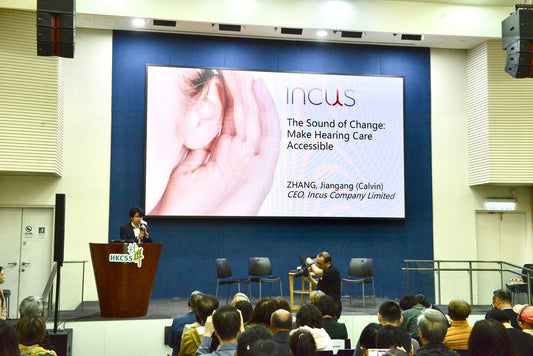
The World Health Organization warns that 1.1 billion people are at risk of hearing loss from unsafe use of personal audio devices and exposure to loud sounds in nightclubs and bars. Listening to music or playing games with headphones for a long time can lead to temporary or permanent hearing loss. Hearing loss caused by continued exposure to loud sounds is called noise-induced hearing loss (NIHL). This article introduces noise-related hearing loss and the top seven tips for preventing it.
What Is Noise-Induced Hearing Loss?
The Brazilian Department of Health defines noise-induced hearing loss (NIHL) as hearing loss caused by prolonged exposure to noise. Usually, NIHL gets progressively worse over time. Staying in an environment with a sound pressure level of 86 decibels or above for a long time will cause damage to the inner ear hair cells, leading to noise-induced hearing loss.
A common symptom of NIHL is being able to hear that people are talking, but being unable to understand the contents of the speech.
The Impact of Noise on Hearing Will Accumulate Over Time
The impact of noise on hearing depends on three main factors:
- The intensity (volume)
- Duration (length of time)
- Frequency of exposure to noise
These three factors are interrelated and contribute to the overall sound energy level that a person’s ears are exposed to.
Regular or long-term exposure to noise will gradually cause irreversible damage to hair cells, leading to permanent hearing impairment. Often, this turns into age-related hearing loss.
How Loud Is Too Loud? The Safe Level of Hearing
Occupational health and safety administrations (OSHA) and international standards specify limits for how long it is safe to be exposed to various sound levels each day.
The limits they define vary, but the following table shows typical limits:
|
Volume (dBA) |
Maximum exposure time (per day) |
|
85 |
8 hours |
|
88 |
4 hours |
|
91 |
2 hours |
|
94 |
1 hour |
|
97 |
30 minutes |
|
100 |
15 minutes |
The permissible time for safe listening decreases as sound levels increase. At 85 decibels, the maximum safe duration is 8 hours, while the safe time for exposure to a sound level of 100 decibels would be only 15 minutes per day. Hearing damage starts beyond these points. Another way to look at the limits is that 8 hours of 85 decibels is the same noise exposure as only 15 minutes at 100 decibels.
Be careful to avoid sounds above 100 decibels. Loud sounds from explosions and jet engines could cause instant deafness from eardrums rupturing.
Unsafe Listening Habits
A Swedish study about headphone listening habits showed that around 10% of adolescents listen to music at unsafe levels (90-100 dB) for prolonged periods.
The impact of noise may not be noticeable when you are young. As you get older, your hearing loss will gradually deteriorate until the problem becomes obvious.
The risk with headphones is that some could produce sounds as high as 135+ dB. In recent years, smartphone and earphone manufacturers have taken steps to protect users. Some smartphones set a limit at 80% of maximum output, requiring the user to consciously decide to raise the volume. This mechanism reminds users about the dangers of listening to music at loud volume while also preventing the volume from accidentally being adjusted too loudly.
How Loud Is My Environment?
The noise in the cabin of subway-train can be around 100 dB.
At nightclubs, discotheques and bars, average sound levels can range from 104 to 112 dB; noise levels at pop concerts could be higher.
Noise levels at sporting venues typically range from 80 dB to 117 dB. The average noise exposure during the Football World Cup in 2010 was as high as 100.5 dB. Even a short duration of exposure to high-decibel levels such as these can be harmful. Habitual exposure almost certainly leads to hearing loss over time.
Tip: As a general rule of thumb, if a sound feels too loud, then it probably is.
Noise-Induced Hearing Loss Can Be Prevented
Regardless of age, hearing impairment can affect interpersonal communication, mental health and quality of life. However, half of the causes of hearing impairment are avoidable by following safe listening habits.
It is essentially about avoiding loud, close or long-term noise, and taking appropriate measures to protect the ears from infection, injury, and drugs or chemicals harmful to the ears.
Seven Recommendations on Reducing the Risk of Hearing Damage Caused by Noise
Maintain healthy hearing by:
- Be aware of the safe listening volume level (75 decibels or below) and pay attention to your daily noise-exposure
- Follow the 60 – 60 rule for listening to music through headphones: Adjust the volume to no more than 60% of the maximum volume. Limit use to less than 60 minutes a day
- Use technology. Active noise cancellation earphones enable you to hear at a lower volume setting. A smart personal sound amplifier amplifies only the frequencies where your hearing is less sensitive. This makes audio more clear without turning up the volume
- Be mindful about the volume setting when playing music, games or movies with fluctuating sound levels. Sudden sounds (e.g. shooting, hammering, and firecrackers) and fluctuating sounds (e.g. road traffic noise or rock music) can be more harmful than stable sounds. The reason is that we tend to turn up the volume to hear the less loud parts, and once the song, game or movie has sudden loud sounds, those are much louder than what is safe. It is common for first-person shooter players to crank up the volume to hear the opponents’ footsteps, which leads to the volume being extremely loud once they come under fire.
- Keep your distance from loud sound sources like loudspeakers. The intensity of the sounds reaching your ear declines when you physically distance yourself from the source
- Give your ears breaks, regardless of whether you are using headphones or attending a party to reduce the overall exposure
- Wear hearing-protection headphones or earplugs before exposing yourself to extra loud sounds - even if it is only going to be for a short period



